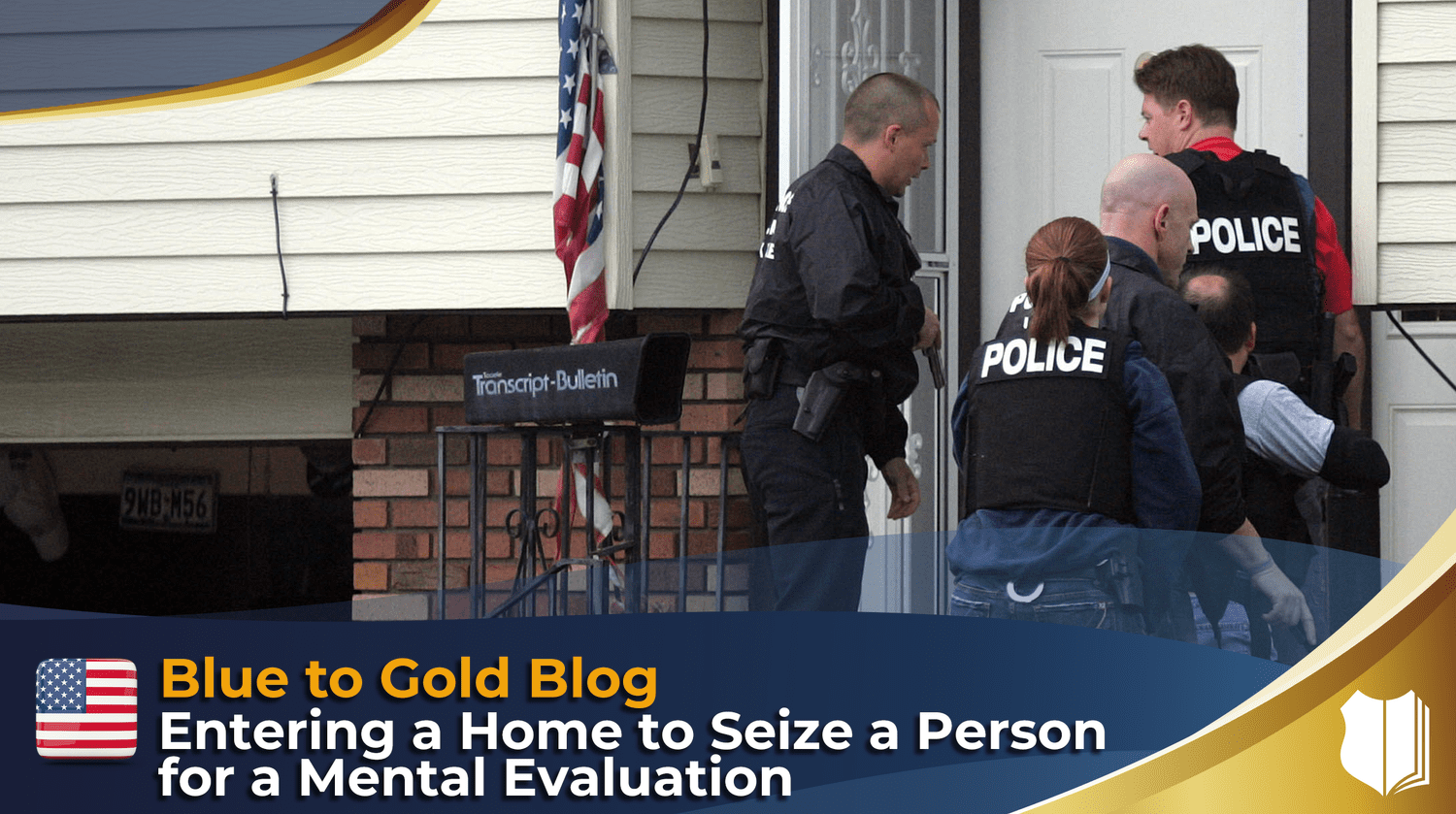May police enter a home to take somebody into custody for a mental evaluation?
This question comes from an officer in Texas.
He says, “As we all know, police have been increasingly contacting people with mental illness. Most of these subjects are encountered in public places where officers are able to make a face to face contact and evaluation to determine the subject’s mental status and whether or not they meet the requirements of the Texas Health and Safety Code.” (Section 573 dot 001.)
Well, what about instances where the subject is inside their home? And they do not want to come out of the apartment or hotel? Can we make a forced entry to go get them? Well, great question.
Let’s go through some law. Number one is, let’s read the pertinent part of Texas Code Section 573 dot 001 that says: “A peace officer without a warrant may take a person into custody regardless of the age of the person, if the officer:
(1) has reason to believe and does believe that the person is a person with mental illness and because of that mental illness, there is a substantial risk of serious harm to the person or to others, unless the person is immediately restrained and
(2) believes that there is not sufficient sufficient time to obtain a warrant before taking the person into custody.”
Well, the one thing that it does not say there, is what do you do when they’re in the home? The legislature cannot tell you to do something that is unconstitutional, right? So we’re not talking about the home here. But if we are going to take a person into custody under this code, we have to have lawful access to them.
Well, that brings in the emergency aid exception. The emergency aid exception consists of two factors. Number One: The officers have an objectively reasonable basis to believe that there is an immediate need to protect the lives or safety of themselves or others or the person that they’re going after. And, number Two: The manner and scope of the entry is reasonable.
So it sounds like they’re all interrelated, which they kind of are right. But the point is, if you want to go into a home, in order to save somebody, and render aid, you have to have the emergency aid exception. Before a lot of cops were taught it was the community caretaking exception. But that is not the case.
Community caretaking does not apply to homes. We know that from a case called Caniglia versus Strom. Instead, it’s the emergency aid exception.
All right, now let’s apply it to the facts here, right? If the officer believes and has facts or circumstances that he or she can articulate that, “Look, if I don’t go in now, this person is going to kill themselves. If I don’t go now they’re going to hurt somebody else,” then you go in under the emergency aid exception, and you then detain them under this section 573 dot 001.
At the same time, if you’re like, “Well, I think that they need a mental evaluation, I think that they are a person with a serious mental illness. If they get out and if they eventually leave the home or go down the road, they’re going to be a harm to themselves. But I have time to go get a warrant,” then you go get a warrant.
So the other thing I want to share with you is that in my opinion, sometimes these mental holds are not justified. Let’s just put it that way. I’m not saying all the time, or most of the time. I’m just saying that sometimes I have seen where officers are helping to detain somebody, when if you were to ask that officer, “Do you really believe under these conditions that this person is really a serious risk of harm to themselves or others? Or are they just a little crazy? Or have they just been upsetting people with the way that they’re acting?
Is that what’s going on here? Or do you really believe that if you don’t act now, this person is going to be a harm to themselves or others?” then what would he or she say?
Sometimes the officers say, “Just because they’re crazy, or they have a mental illness. We just want to make sure they get checked out.” And if you’re talking like that, then what I don’t think you have is an exigency to detain that person against their will to take them to a hospital to get evaluated.
Instead, you would want to see their cooperation, right? “Hey, go get checked out, it’s in your best interest.” Or in some extreme cases, try to go get a warrant to detain them. I’m just trying to tell you that sometimes it’s okay to let people go, when you don’t have the facts to back up the detention.
I wish I had the exact case on point here for my answer, as to what you’re going to have to articulate.
You know you’re going to have to articulate that exigency. You probably have it by the fact that you’re going to commit them against their will. You need facts and circumstances that give you reason to believe that they are a substantial risk of serious harm to themselves or others, so you probably already have it, but that’s what gets you into the home as well. But you have to articulate it.
If you’re not sure, and you’re kind of on the fence, I personally would go get the warrant. That’s what I would do.
I hope this helps. These blog articles are made to help you get it right every single time to stay out of court or if you go to court, you win. Alright, until next time, my friends stay safe.











